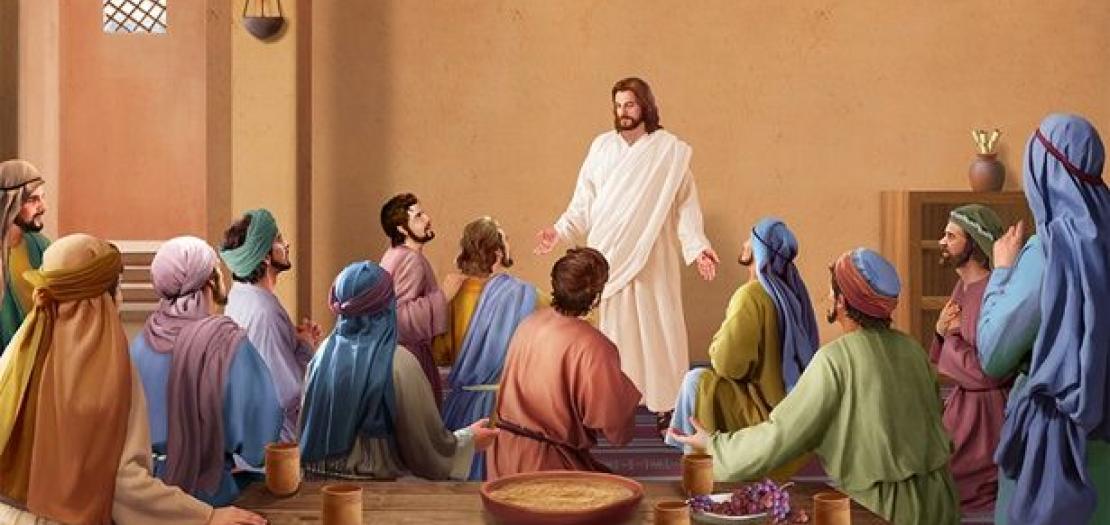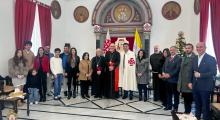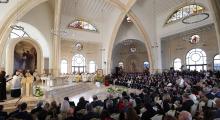Issued by the Catholic Center for Studies and Media - Jordan. Editor-in-chief Fr. Rif'at Bader - موقع أبونا abouna.org

Following is the text of the meditation by Latin Patriarch of Jerusalem His Beatitude Pierbattista Pizzaballa for the 29th Sunday of ordinary time, year B, October 17, 2021:
For the third time, Jesus speaks to His disciples about His Passion, and for the third time He shows they not only fail to understand but they are also very far from the heart that Jesus displays.
Today’s scene (Mk 10:35-45) immediately follows the third announcement of the Passion, and is even more out of tune with the first two: it seems that while Jesus draws near to Jerusalem, the disciples, on the contrary, move away from it.
Let us dwell here on some passages.
The first is the demand of the sons of Zebedee: “We want you to do for us whatever we ask of you” (Mk 10:35). Even on first hearing, this question is unpleasant to us. Why? It appears to me for at least three reasons: the first ties into this “we want.” An expression that tells of life, a thought, a feeling that moves parallel to those of Jesus, without meeting them. If the Son is the One who does the Father’s Will; if the disciples are those who make this same confident obedience their own, James and John are closed in their world and lost in their dreams of greatness. They have their own will, which is not the same as their Lord. The second is the way of being in the presence Jesus, the type of relationship that this question implies, the expectations they have of Him: namely, thinking of Jesus as someone who can do everything for them. As someone who, able to do everything, who will undoubtedly satisfy all of one’s needs, all of one’s dreams. In reality, it’s not like this. Jesus never does this, because He loves us by bringing us to the Father, opening us to Him. He does not give us anything that does not serve this, anything that is an obstacle to our salvation. The third is the fact of a request being exclusive: James and John are thinking about themselves, in a way that excludes the others. They feel as if the others did not exist.
But, why do they ask this question?
The reply is in the words of Jesus when he says that, in reality, they don’t know what they are asking. The disciples’ problem is exactly this not knowing. The verb “to know” is important in the Passion: in John’s Gospel, Chapter 13, the entire Passion depends on this verb: “Jesus, knowing that His hour to pass from his world to the Father had come…” (John 13:1); and a little further: “… knowing that the Father had given everything into his hands…” (John 13:3). Jesus knows who He is, from where He’s coming and going; and knowing, loves to the end, takes off His garments, wraps a towel around Himself and washes feet. So, “knowing” is essential: to be aware of one’s call, of the gift received. Knowing that this is enough in life, it’s not necessary to add anything else. Also, that we possess this gift and at the same time we share it, or instead at the moment when we rid ourselves of us and place ourselves in service. At the moment when we give our life, like Jesus: this is true greatness, and we must know it. Otherwise, we will lose ourselves in our own sterile and disruptive dreams of grandeur.
In reality, only after Easter will the disciples know how much they were loved. And they will know it even more by the fact of not being present: to the right and to the left of the crucified Lord (it’s interesting that this expression “to the right and the left” occurs in Mark only two times, here and on the cross), in His glory there will be there two thieves. Only then will the disciples know that the gift is gratuitous.
The next passage concerns Jesus’ answer: while the disciples make requests related to the imagery of loftiness, of greatness, Jesus, on the contrary, uses images of descent, lowering, and immersion. To say that true glory is not at the top, but as low as possible, bowing at the feet of a brother in a humble gesture of service.
One encounters glory by lowering and losing oneself, precisely the opposite of how one would humanly expect.
And if the way of life of the two brothers is exclusive and disruptive, that of Jesus creates communion and leads to encounter: it is living for others, and not for ourselves, the price of the Cross.
We can approach this passage in the account of the temptations of Jesus in the desert: also in that context Jesus is put to the test and called to choose between the ephemeral glory of the world and that given by the Father; and there Jesus will learn to ask the Father for real glory, as He will often repeat in John, chapter 17, where the glory that Jesus asks does not belong to the symbolism of power and supremacy, but only of love.
+Pierbattista
 Latin Patriarchate of Jerusalem honors Knights of the Holy Sepulchre with golden medals
Latin Patriarchate of Jerusalem honors Knights of the Holy Sepulchre with golden medals  Jerusalem: Augusta Victoria Hospital offers free treatment for Gaza children diagnosed with leukemia
Jerusalem: Augusta Victoria Hospital offers free treatment for Gaza children diagnosed with leukemia 




